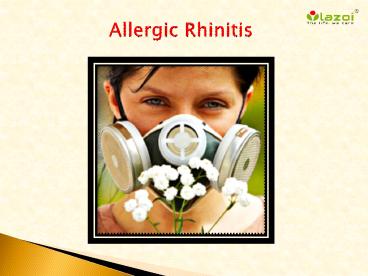Allergic Rhinitis : Causes, Symptoms, Diagnosis, Risk factor, Prevention Treatment in India - PowerPoint PPT Presentation
Title:
Allergic Rhinitis : Causes, Symptoms, Diagnosis, Risk factor, Prevention Treatment in India
Description:
Allergy caused by allergen is considered as harmless substance that causes reaction which in turns causes allergy. Allergic rhinitis, or hay fever is a response towards the specific allergens.During the seasonal allergic rhinitis pollen is considered as the common allergen. – PowerPoint PPT presentation
Number of Views:115
Title: Allergic Rhinitis : Causes, Symptoms, Diagnosis, Risk factor, Prevention Treatment in India
1
Allergic Rhinitis
2
What is Allergic Rhinitis?
- Allergic Rhinitis, commonly known as hay fever,
is one of the most common allergic conditions,
and occurs when the nasal cavity is exposed to
foreign particles such as pollens, dust, etc. The
person starts sneezing or develops a running nose
on breathing something which the immune system is
allergic to. Allergic Rhinitis is also referred
to as seasonal allergies and is triggered
by grass, pollen, dust and dirt in the air, and
at times because of smoke and perfumes. Allergic
rhinitis is not severe or fatal until accompanied
by asthma or anaphylaxis, which can be
significant. - Drugs namely Antihistamines is used to treat
Allergic Rhinitis, and together with other drugs,
they make up a fraction of over-the-counter
drugs, and is prescribed every year. - Allergic rhinitis is an allergic response to
specific allergens. Pollen is the most common
allergen in seasonal allergic rhinitis. These are
allergy symptoms that occur with the change of
seasons.
3
Symptoms
- What are the symptoms of Allergic Rhinitis?
- Some people notice symptoms rarely when exposed
to allergens, while others may face them all the
time. Consult a doctor if symptoms last more than
a week. The most common signs and symptoms of
Allergic rhinitis include - Sneezing
- Itching of Nose, eyes, and ear palate
- Congestion and headache
- Red eyes, swelling of eyes, tears, and ear ache
- Postnasal drip
- Anosmia
- Fatigue and drowsiness
- Malaise
- Problems with smell
4
Treatment
- Which specialty of doctor to be consulted for
the treatment of Allergic Rhinitis in India? - Allergist or an immunologist is to be consulted
for the treatment of Allergic Rhinitis in India. - Which hospital to be preferred for Allergic
Rhinitis treatment in India? - Medanta - The Medicity hospital in India to be
preferred for Allergic Rhinitis treatment in
India.
5
FAQ's
- 1. What are the causes of Allergic Rhinitis?
- When human body comes in contact with allergens,
body releases chemical histamine. This chemical
acts as an immune system and causes allergic
rhinitis. Common causes of Allergic Rhinitis are - Pollen
- Trees
- Dust and dirt
- Animal danger
- Cat saliva
- Animal fur and wood dust
- Mold
6
FAQ's
Continue
- 2. What are the risks associated with Allergic
Rhinitis? - Allergic Rhinitis can affect anyone, but is
likely to affect those that have a family
history. The main risk factors are - Smoke
- Cold weather
- Humidity and wind
- Hairspray
- Pollution
- Smoke due to burning of crackers, wood, waste,
etc - Perfumes and chemicals
- 3. What are the possible ways to prevent Allergic
Rhinitis?
7
FAQ's
Continue
- The best way to prevent Allergic Rhinitis from
occurring is to manage them by avoiding exposure
to substances that cause allergies. Tips
to prevent Allergic Rhinitis are - Avoid going outdoors when pollen count is high
- Exercise indoor early morning
- Showers right after coming from outside
- Cover your nose and mouth while in open
- Avoid using carpets at home if you are allergic
to dust mites - 4. How is Allergic Rhinitis diagnosed?
- At Medanta in India, in case of severe symptoms,
Allergic Rhinitis tests that are recommended
include - MRI Scan
8
FAQ's
Continue
- CT Scan
- Skin Test
- Blood Test
- Radiography
- Total Serum IgE
- 5. How is Allergic Rhinitis treated?
- At Medanta in India, doctors may advice medicines
for treatment depending on condition and severity
of symptoms. The management of allergies may
include - Antihistamines Can be taken to treat Allergic
Rhinitis. The medicines control production of
hormone histamine in the human body. Some of the
popular over-the-counter antihistamines are - Allegra
- Clarinex
9
FAQ's
Continue
- Xyzal
- Zyrtec
- Claritin
- Decongestants
- They can be used over a short period, i.e. not
more than 3 days on a go, and can be used to give
relief from stuffy nose and blocked sinus.
Popular decongestants include - Afrin nasal spray
- Sudafed
- Sudafed PE
- Zyrtec-D
10
FAQ's
Continue
- Immunotherapy (allergy shots)
- If avoiding pollens is not possible, or symptoms
are hard to control, allergy shots are given in
small amounts till the symptoms come under
control. - Sublingual Immunotherapy (SLIT)
- These are medicines put directly under tongue. It
may help in cases of grass and ragweed allergies.
11
CONNECT WITH US
- Logon to
- www.lazoi.com
- Like us on Facebook
- https//www.facebook.com/LazoiTheLife
- Follow us on Twitter
- https//www.twitter.com/lazoithelife
- Follow us on Pinterest
- https//www.in.pinterest.com/lazoithelife































